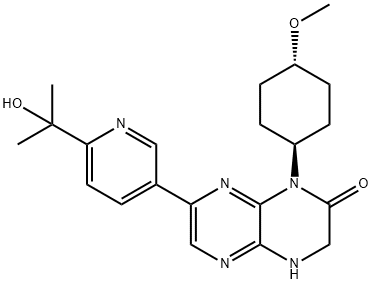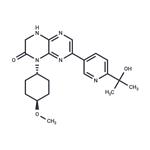Description
CC-223 is a potent, selective, and orally bioavailable inhibitor of mTOR kinase, demonstrating inhibition of mTORC1 (pS6RP and p4EBP1) and mTORC2 [pAKT(S473)] in cellular systems. After tumor-bearing mice was treated with CC-223 for a single oral dose. It exhibited dose-dependent tumor growth inhibition in multiple solid tumor xenografts. The observed antitumor activity of CC-223 is likely to be mediated through inhibition of both mTORC1 and mTORC2. CC-223 is currently in phase I clinical trials for its treatment of advanced solid and hematologic cancers.
References
Varga, Andrea, et al. "Phase I expansion trial of an oral TORC1/TORC2 inhibitor (CC-223) in advanced solid tumors." Journal of Clinical Oncology 31.15(2013):-.
Mortensen, D. S., et al. "CC-223, a Potent and Selective Inhibitor of mTOR Kinase: In Vitro and In Vivo Characterization." Molecular Cancer Therapeutics 14.6(2015):1295.
Goy, A, et al. "Phase I expansion trial of an oral TORC1/TORC2 inhibitor (CC-223) in diffuse large B-cell lymphoma (DLBCL) and multiple myeloma (MM)." Neuroendocrinology 43.3(2013):276-276.
Shih, Kent C, et al. "Phase I trial of an oral TORC1/TORC2 inhibitor (CC-223) in advanced solid and hematologic cancers." Journal of Clinical Oncology (2012).
Description
CC-223 is a potent inhibitor of mTOR (IC
50 = 16 nM) that shows selectivity for mTOR over a panel of 246 other kinases. It blocks signaling through both mTORC1 and mTORC2, inhibiting the phosphorylation of S6RP, 4EBP1, and Akt(S473) in cellular systems. CC-223 inhibits growth and induces apoptosis in hematologic and solid tumor cell lines
in vitro, and it exhibits dose-dependent tumor growth inhibition in multiple solid tumor xenografts
in vivo.
in vitro
cc-223 was identified as an atp–competitive inhibitor of the mtor kinase targeting mtorc1 of both 4ebp1 and p70 s6 kinase 1 and mtorc2, which prevented the upregulation of akt phosphorylation. moreover, cc-223 was selectively potent to mtor kinase while showed more than 150-fold sensitivity against the related lipid kinase, pi3ka. in addition, cc-223 was active over many non-hodgkin lymphoma cell lines and solid tumor lines such as including glioma, breast, hepatocellular carcinoma, as well as non–small cell lung cancer [1].
in vivo
in animal study, cc-223 was selected for evaluation in pc-3 tumor bearing efficacy mouse models. mice were orally treated with vehicle or various doses of cc-223 once daily or twice daily at a dose of 5 ml/kg for 21 days, and the final reductions of tumor volume were measured following the final day of dosing. results showed that all cc-223 had dose- and schedule-dependent inhibition of tumor growth in the pc-3 model. moreover, the maximum observed efficacy for cc-223 was determined to be 87%, at its tolerated dose of 25 mg/kg q.d. [1].
References
[1] mortensen ds, et al. discovery of mammalian target of rapamycin (mtor) kinase inhibitor cc-223. j med chem. 2015 jul 9;58(13):5323-5333.
[2] bendell jc, et al. a phase i dose-escalation study to assess safety, tolerability, pharmacokinetics, and preliminary efficacy of the dual mtorc1/mtorc2 kinase inhibitor cc-223 in patients with advanced solid tumors or multiple myeloma. cancer. 2015 oct 1;121(19):3481-90.



